Reviews - May 2013 - Reform Magazine
Hard times, and ordinary
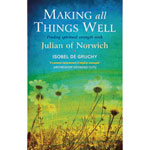
Making All Things Well: Finding Spiritual Strength with Julian of Norwich
Isabel de Gruchy
Canterbury Press
£9.99
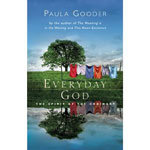
Everyday God: The Spirit
of the Ordinary
Paula Gooder
Canterbury Press
£8.99
___
Making All Things Well is an introduction to the work of Julian of Norwich, the 14th-Century mystic whose writings through years of plague, war and personal illness seem to resonate with those seeking a spirituality for our times. Isabel de Gruchy introduces Julian’s work through a series of 40 meditations, each including a biblical passage, her own reflection and poetry based on Julian’s work, and a prayer. Julian is probably best known for the quote which forms the title of the book: “All shall be well, and all manner of things shall be well”; but Isabel de Gruchy brings out clearly the suffering and confidence in Christ in which this hope is rooted. At times, I would like to have read more of Julian’s own words, and less of the author’s interpretation, but nonetheless, for any who wish to know more of Julian and be inspired by her faith and spirituality, this is an invaluable beginning.
Everyday God is also a series of short reflections, based on that section of the liturgical year that runs from Trinity Sunday to the beginning of Advent. However, the book stands independently of the calendar, inviting us to look at our own lives, and those of biblical characters, in such a way that we discern and celebrate the presence and activity of God in everyday lives and events. Each reflection begins with a biblical passage and Paula Gooder reflects on these in a lively and imaginative way from her background in biblical scholarship. The God we meet here is one whom we encounter in the ordinary events of our lives, yet who calls us to an extraordinary way of living.
Each of these books offer daily readings for Lent, ordinary time, or any period of the year, for those seeking fresh inspiration for reflection or prayer.
The Revd Dr Jan Berry is principal of Luther King House Open College, Manchester
____
Appraising our church today
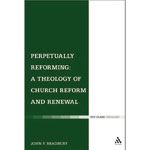 Perpetually Reforming: A Theology of Church Reform and Renewal
Perpetually Reforming: A Theology of Church Reform and Renewal
John P Bradbury
Bloomsbury Academic (T&T Clark)
£65 (hardback)
___
Calvin’s heirs said that the Reformation of the church is never over and so coined the phrase semper reformanda. Dr Bradbury, who teaches ordinands at The United Reformed Church college in Cambridge, is aware that if ‘our’ church is too ready to change and adapt, the loss of confidence about who we are and what we stand for could be a factor in our decline. However, he is challenged by the growth of such movements as Emerging Church and Fresh Expressions to make an even better case for perpetually reforming. He is helped in so doing by wide reading in social theory, conversations with ecumenical partners, and study of two of our best theologians, John Calvin and Karl Barth.
He is at his best when true to his own convictions that we need to deal with the church as it actually is, not with some abstract theory. He comments approvingly on the reforming spirit of the URC approach to worship and the way we rethink our faith and write new hymns. He also notes how all churches have been compelled to rethink their attitudes, for example, to the Jews, to the Hebrew Scriptures and the ways in which God’s covenant is continually renewed.
He is not so good when he attempts to talk about the whole church without the use of the visible/invisible church distinctions which he constantly rejects. We do believe in one holy, Catholic and apostolic church – even though we cannot see it. Roman Catholics say: -Yes you can – look at us!’ We Reformed Church people – like Paul! – hope and pray for what we do not yet see. And he could have drawn more widely from other Reformed ecclesiologies – John Owen, P T Forsyth, John Oman, Nathaniel Micklem, Eduard Schweizer and Bruce McCormack, are quietly ignored. Barth too has much more to offer.
Donald W Norwood is a retired United Reformed Church minister living in Oxford
____
Different approaches to struggle
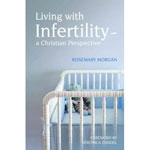 Living with Infertility – A Christian Perspective: The Search for Peace and Hop
Living with Infertility – A Christian Perspective: The Search for Peace and Hop
Rosemary Morgan
The Bible Reading Fellowship
£7.99
 Lessons from Katherine
Lessons from Katherine
Glenda W Prins
Circle Books
£11.99
___
These two books are chalk and cheese. Glenda W Prins tells the story of life with a child with severe cerebral palsy. Rosemary Morgan’s approach is to take each emotion that infertility raises, and help the reader to deal with it.
Morgan is fiercely honest about the emotions involved; she includes: anger, jealousy, disappointment and confusion, but there is also hope (with despair) and love and being loved. Her teaching is Bible-centred, with well-chosen references. By its very nature, the book is didactic and it can occasionally be a bit heavy. The chapter on forgiveness is long and detailed, and I got slightly lost at times.
It occurred to me that one wouldn’t read this book unless one were already wanting to cope with the awfulness of not conceiving; it would be so easy to let one’s life be consumed by this. But if one were wanting to feel something positive, to be able to find God again, or just to share the feelings with an honest woman who has been there too, then there is some consolation in these pages. Whether it would be fully effective would be, I suspect, down to the reader and his/her determination, but reading this book might be a good place to start the journey.
Glenda Prins spends a long time cataloguing her anger and rage at her situation. She adopted an apparently healthy baby only to find that she was severely disabled. Much of the misery is caused by faults in the US medical system and its practitioners, and the response of some Christians to Katherine. The book is short on joy. Katherine is much loved by her parents, but misery dominates. Finally, Mrs Prins becomes a pastor, and her faith seems to carry her a little higher in the water. The book is part of a series entitled Spiritual Struggles, and to a degree the spiritual does eventually help with the struggle.
Ruth Allen is a retired United Reformed Church minister based at Ilkeston URC, Derbyshire
____
Challenging advice
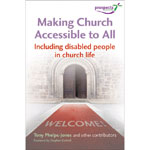 Making Church Accessible to All: Including Disabled People in Church Life
Making Church Accessible to All: Including Disabled People in Church Life
Tony Phelps-Jones, with other contributors
Bible Reading Fellowship
£7.99
___
The word “inclusive” is double-edged. On one hand it is about enabling belonging, but it can so easily be about “being like us”. In churches, “welcome” too easily carries the implicit qualification of “doing things our way”. The challenge of being inclusive of people with disabilities is that we are called to welcome them “as they are”. Indeed, any change needed is within ourselves, both in terms of attitude and in practical approaches. Such inclusiveness is the challenge of this book, and it spells out the challenge by assisting our thought and reflection, and offering practical wisdom.
An inclusive church group of people with disabilities used to sing: “There is no one else like you, there’s no one else like me. Each of us is special to God, that’s the way it’s meant to be.” The cherishing of individuality and the avoidance of a “one size fits all” approach is what comes across clearly in this book, which aims not only to give pointers to the particular needs of people with a wide range of disabilities, but also to indicate how church can change in order to include them. Here, the word “church” needs to be read as “people following Christ” before considering the practical actions which reveal true “following”. An implicit message in this book, behind the knowledge and experience of what is practically helpful, is that we need an open and Christ-like attitude towards any who wish to share in our fellowship. Biblical teaching underlies much of what is offered here.
“If you want to learn something, go to an expert,” is a good adage. In the matter of how a church may be more accessible to people with disabilities, Tony Phelps-Jones carries that expertise. He is director of ministry for Prospects and part of Churches for All, a broad consortium of Christian disability organisations who are always willing to offer further advice and support (the book is full of links). Voice is given in the book to the experience of others working in the fields of disability ñ hearing, sight, mobility, learning, autism, children and mental health; together they offer challenging advice to all of us, if we are willing to accept it.
Mark Fisher is a United Reformed Church minister based at Christ Church URC in Solihull, West Midlands
____
The case against cherries
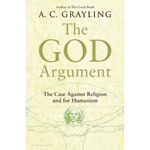 The God Argument: The Case Against Religion and for Humanism
The God Argument: The Case Against Religion and for Humanism
A C Grayling
Bloomsbury
£16.99 (hardback), £8.99 in paperback from 1 May
___
One has to sympathise with Professor Grayling; he gets so annoyed by cherries ñ and yet there are so many of them in his book. AC Grayling is Professor of Philosophy at New College, London, and his concern in The God Argument is to show that religion is false and humanism is true. Of course, not all religion is the same, and so he recognses two varieties: “fundamentalist” and “non-fundamentalist”. The former is homophobic, misogynistic, warmongering, murderous, superstitious and anti-scientific, so that’s disposed of easily enough.
But then come the cherries. Professor Grayling is repeatedly exasperated to find that when he disproves a supposedly vital tenet of religion – from the virgin birth to the ban on contraception – there are believers saying: “I never believed that anyway”. This, he repeatedly complains, is “cherry-picking the given religion’s doctrines”.
Cherry-picking makes him feel we’re moving the goalposts of apologetics, because the failure of all Christians to agree what they believe makes faith much harder to disprove. What’s more, it is dishonourable and dishonest, he says, to sign up to a religion but not believe all its doctrines. The other word for cherry-picking “is not a comfortable word; it is hypocrisy”.
It’s quite an extraordinary argument. For one thing, it seems to assume that there exists a monolithic body of Traditional Christian Doctrine, which, before modern critics made us squeamish about it, all Christians subscribed to. In reality, of course, there were always Marcionites disagreeing with Ebionites, and Arians disagreeing with Monophysites, and Calvinists disagreeing with Anglo-Catholics, and all of them disagreeing with each other, and each group disagreeing among its own members. There are at any one time as many Christianities as there are Christians, and given time there are many more.
The same thing applies to philosophies, and so it should. One wants to ask Professor Grayling whether he subscribes to a body of thought called Traditional Philosophy, or if there is a philosophical school to which he submits unquestioningly, or if all thinkers should develop their own opinions independently without being accused of hypocrisy. Professor Grayling says that cherry-pickers select their beliefs because they are more congenial and easier to live with. It is not at all clear on what basis he discounts the possibility that they select their beliefs, as perhaps he does himself, because they appear to be true.
After this demolition of both kinds of religion, Professor Grayling goes on to outline the values of the humanism that should replace it. The true path for all people, he says, involves thinking for yourself, taking responsibility, respecting human rights, honesty, avoiding harm and opposing war, genocide, poverty, inequality and injustice. And all God’s people, unless I’m very much mistaken, said: “Amen”.
Stephen Tomkins is editor of Reform
___
Theatre review: The rude testament
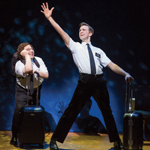 The Book of Mormon
The Book of Mormon
The Prince of Wales Theatre, London
Created by Trey Parker and Matt Stone
Until 21 September
The Book of Mormon pokes fun at organised religion (we’re talking about the musical here) and at Westerners’ romanticised vision of Africa. It has the style and language of Stone and Parker’s South Park, which, for those unfamiliar with the show, is offensive to all and hurtful to none. Combine this with pop composition and joyous choreography by Casey Nicholaw, referencing the Golden era of Broadway and Disney’s The Lion King, and you get an idea of what you are in for: a riotous, offensive, and surprisingly charming night out. Be sure, this is not Jerry Springer the Opera, which I found long and dull. Underneath the thick layer of swearing and course jokes, this is a show about the power of faith to restore a community in the face of seemingly insurmountable troubles. And it is funny, very funny.
Elder Price, played by Gavin Creel, has coiffured hair, a colgate smile and a great future because God has chosen him to go to Orlando, his favourite place in the world. Elder Cunningham, meanwhile, is shorter, rounder, and merely wants a friend. He also has a problem with compulsive lying and struggles to read more than one page of the Book of Mormon. How they become paired up and sent on their first mission to Uganda is a mystery to Price.
After encountering luggage-stealing commandoes and witnessing the shooting of a villager, Price starts to question God’s path for him because “Africa is NOTHING like the Lion King!” How do you convince a village of poor, scared, AIDS sufferers that the words of the US Prophet Joseph Smith mean anything to them? Unlikely hero Elder Cunningham has the answer. Using his imagination in response to the villagers’ lack of interest, he creates a new US Bible full of references to AIDS, The Lord of the Rings and Ewoks with Sal Tlay Ka Siti (Salt Lake City) replacing the afterlife as the ultimate reward for all believers. Do the villagers embrace the “facts” of this Bible as truth or metaphor? In the end, the show tells us, it doesn’t matter.
The staging and sets are kitsch references to Christian imagery, with soft focus lighting, pastel colours, tableaux, stained glass turrets and a silver archangel trumpeting the start of each act. Musically there is not a dud tune in the show. There are sequined waistcoats, soft shoe tap routines, soaring harmonies and the performances of both leads and ensemble are uniformly excellent. The standing ovation the audience gave them on the night I was watching testified to that.
But perhaps what stands out most is the three-page advert for the Mormon faith in the programme, the tagline being: “You’ve seen the show, now read the book.” A great example of turning the other cheek…and then some!
Celia Meiras is a freelance journalist and actor
____
These reviews were published in the May 2013 edition of Reform.













Submit a Comment